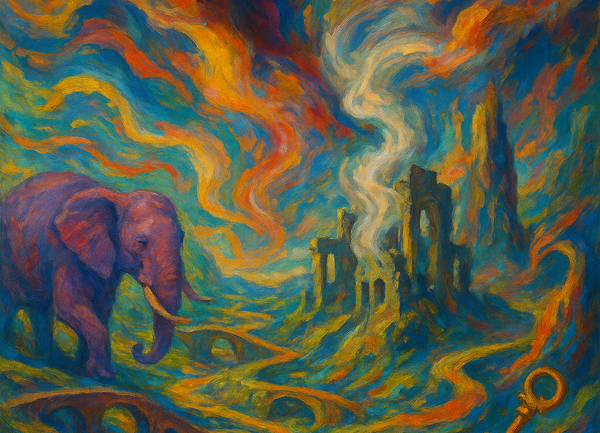Language Is Your Hammer. Try Not to break Yourself.

Every sentence you speak is a swing of the hammer. Build something. Break something—your choice.
Communication is key towards good relationships. But it's also quite hard to do it right (apparently). There is a correct style, intonation, and a lot of "meta" information that we need to ensure is accurate so that our words are interpreted the same way we intend them to be.
If you were put in a room with someone who doesn't speak your language. Outside of questioning why you are locked up in a room, you would also probably start to try to communicate by pointing at things and saying their names, like: "Tree", "Chair", or "Window". (How did we get a tree in a room?)
At the core of our language exists definition.
Definitions are simple! They are either true or false! And every definition only depends on every other definition. Sounds stable? Yeah.. Language is known to be consistent. Especially languages like French. So, good luck avoiding variation across different words (let alone when we introduce more subjective elements like intonation or facial movements).
1. Communication isn’t about speaking. It’s about validating.
Language isn’t a clean highway where you shout things across and assume they land. We feel as we talk, and we believe it's being received, which is the biggest faith we all have. Do you know the famous sitting in a circle and saying the same thing to the next person until a square becomes a motorboat?
Communication is a two-way street — messy, pothole-ridden, sometimes flooded, sometimes on fire.
Honest communication requires validation:
- "Did you get what I meant?"
- "Does that word mean the same thing to you?"
If you start drawing conclusions without checking?
You’re not communicating — you’re hallucinating.
And hallucinations, when shared wrongly, tend to blow up and completely derail the conversation.
-> I would know because I'm good at it. <-
2. Words aren’t fixed. You aren’t a dictionary.
You don’t carry a static, clean-cut dictionary in your brain. You carry a battered notebook full of scribbles, half-truths, trauma-doodles, and pure rage.
"Love" doesn’t mean the same thing to you as it does to your neighbor.
"Trust" doesn't carry the same flavor once you've been betrayed enough times.
Every time you use a word, you drag your entire life history into it, whether you want to or not. Words have deep and profound meaning, and it takes time to unpack them with each other.
Without validation, language becomes a war of ghosts.
Tip: At times, we also start to assume we know what people close to us mean. Especially in relationships, this can become detrimental. Assuming we know because we have a high level of trust.
3. Definitions rot and mutate over time.
Words aren’t stone tablets handed down from the gods.
They're growing with society — marinated in culture, ego, and bad Twitter arguments.
- "Alpha" used to mean the first,, then a study about wolves, guys with big egos, and who knows what it will become later on.
- "Introvert" according to Jung:
An introvert is someone who directs their energy primarily inward — toward their own thoughts, feelings, and internal world — rather than toward external stimuli or social interaction.
Now it's more like "I don't like hanging out with a lot of people".
Definitions decay, drift, and evolve — sometimes culturally, sometimes regionally. Hey, did I mention we have multiple dictionaries?
4. Dictionaries won’t save you. Openness might.
You can’t dictionary your way out of this chaos.
No amount of quoting Webster’s will force someone to feel what you meant.
The only real weapon you have is openness:
- The willingness to check.
- The humility to ask.
- The patience to clarify.
- The courage to realize you might be wrong about your own words.
Words aren’t blood oaths.
We change — and our words change with us.
If you only listen to what someone says, without feeling the intent behind it, you’re signing up for bitterness and resentment when things change. And things will change.
You won’t just lose the chance to form genuine relationships — you’ll lose the opportunity to discover who you’re becoming.
I might not know exactly what I’ll believe tomorrow.
But if you trust anything about me, trust this:
My intention to be honest is more real than any fact I can offer you today.
5. Language shapes identity. (And ego rides shotgun.)
Every word you use isn’t just information, it also reflects how you see yourself — and sometimes, how desperately you want to be seen.
If you prefer "fighter" over "survivor," you live differently.
If you prefer "loner" over "loser," you think differently.
If you call it "betrayal" instead of "lesson," you heal — or you don't.
The structure of your language literally structures your self.
And your ego?
Your ego clings to certain words like lifeboats — because words are identity anchors.
Change your words, and your whole sense of self starts to crack open.
(Which is terrifying — and also the first real step toward growing.)
Language sculpture
* how to change words to change yourself
I know empty slogans like "just look on the bright side" mean nothing when you're drowning in a sea of pain.
But speech is the first step toward change — not the last.
You don’t need to believe it yet.
You don’t even need to feel it.
You just need to start defining it.
Carve it into the air.
Wrap yourself in it like a bad disguise.
At first, it will feel like lying.
Good.
I call it honest lying — telling the truth of who you want to become, even before you believe you deserve it.
Or call it what it really is:
Talking some courage into yourself. You deserve it.
1. Rename your fears.
Call it "a test" instead of "a failure."
Call it "round one" instead of "the end."
Fear feeds on the words you use to define it.
You want smaller fears?
Use smaller names.
2. Upgrade your metaphors.
Stop saying "life is a battlefield" if you want peace.
Stop saying "I'm drowning" if you want strength.
Your metaphors are the stage sets on which your mind acts.
Build a battlefield, and you'll spend your life fighting.
Build a river, and you might learn how to swim.
Use your sayings and catchphrases wisely.
They aren't just jokes or habits — they’re spells you cast on yourself.
And here's the worst part:
Most of them weren't even yours to begin with.
You inherited them from your parents, from broken mentors, from a world of people who are not you. It is time to choose.
If they no longer fit, break them.
If they never fit to begin with, burn them. (and ask for help to notice them)
3. Speak from the future, not the past.
Instead of saying, "I'm someone who always screws up,"
Say, "I'm someone who learns from screwing up"
Words that predict doom build cages.
Words that predict growth crack them open.
Self-confidence doesn’t start with pretending you’re invincible.
It starts with dignity and self-love — the guts to forgive yourself for failing, and the pride to keep moving anyway. And then wording that to the people around you.
4. Check the emotional payload of your words.
Every word you use carries invisible cargo:
- Shame
- Hope
- Pride
- Guilt
- Rage
Before you speak, ask yourself:
- What feeling am I smuggling inside this sentence?
- Is it helping me?
- Or is it chaining me to old pain?
You can't sculpt yourself if you don't know what you're holding.
First, you have to see the material you're working with — the cracks, the bruises, the hidden strength — before you can carve something better.
Otherwise, you're just hitting stone blindly and wondering why it looks like a moon rock.
5. Catch yourself in your old language — and laugh.
You’re not going to talk like you want overnight.
You’ll catch yourself whining, blaming, spiraling and saying things you wish you haven't.
Good.
Catch it.
Laugh at it.
Call yourself out and change it.
Change is by doing. Not by being.
Endnotes:
When mixing a new color, it always appears unusual before it blends.
Your words will feel unnatural. Your voice might crack.
That’s how you know you’re changing.
If anyone calls you out, tell them the truth:
You're building yourself.
Your journey is yours alone.
People laugh at those who try.
They envy those who succeed.
Keep sculpting yourself with your words.




